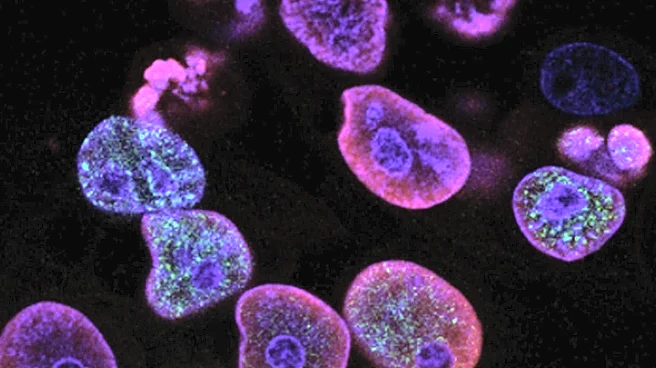What's Happening?
Recent research has identified the transcription factor MEF2C as a critical regulator in microglial development and function, with implications for neurodevelopmental and aging-associated diseases. The
study found that MEF2C expression is enriched in microglia compared to the cerebral cortex during both fetal and postnatal stages. This suggests its importance in early gestational ages and potential as a therapeutic target for alleviating persistent neuroinflammation. The research utilized CRISPR-Cas9 technology to model MEF2C deficiency, revealing significant changes in microglial morphology and gene expression. Loss of MEF2C led to decreased microglial ramification and increased inflammatory markers, indicating its role in maintaining microglial homeostasis.
Why It's Important?
The findings underscore MEF2C's potential as a therapeutic target for neurodevelopmental disorders and age-related diseases. By regulating genes associated with inflammation and neurodegeneration, MEF2C could help mitigate persistent neuroinflammation, a common feature in conditions like autism and Alzheimer's disease. The study's insights into microglial function and gene expression could pave the way for new treatments targeting microglial MEF2C to improve outcomes in neuropsychiatric and neurodegenerative disorders.
What's Next?
Further research is needed to explore MEF2C's therapeutic potential in clinical settings. Investigations into how MEF2C modulation affects neuroinflammation and cognitive function could lead to novel interventions for autism and Alzheimer's disease. Additionally, understanding MEF2C's role in microglial homeostasis may inform strategies to enhance brain health and resilience against neurodegenerative conditions.
Beyond the Headlines
The study highlights the ethical considerations of using gene-editing technologies like CRISPR-Cas9 in research. As scientists explore MEF2C's role in neurodevelopment, the implications for genetic interventions in human health must be carefully weighed. The research also contributes to the broader understanding of microglial biology, emphasizing the importance of transcription factors in brain development and disease.









